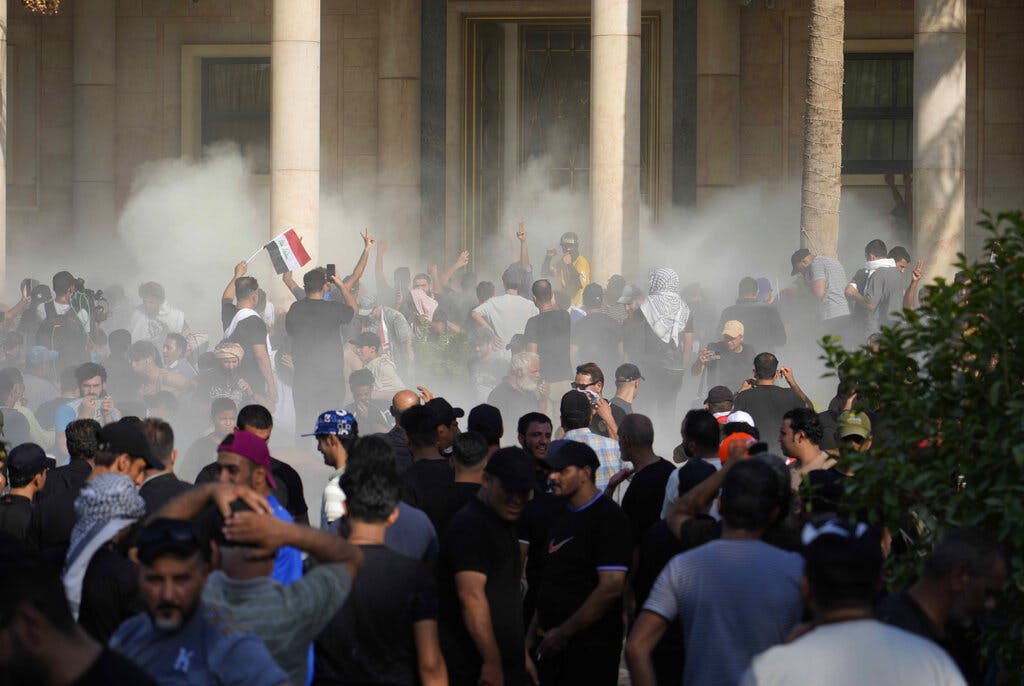Clashes at Baghdad Dredge Up Memories of Fall of Vietnam
Foolishly allowing Iraq to fall under the spell of the Iranians adds yet another layer to Washington’s endless errors.

As deadly clashes erupted after Iraqi supporters of an anti-Iranian nationalist stormed the heavily secured government compound at Baghdad known as the green zone, where several foreign embassies are situated, helicopters were seen hovering over the American embassy in a scene reminiscent of the fall of Vietnam.
America has long given up on Iraq, yet Washington is adamant that all is under control. “There’s no evacuation going on at the embassy and no indication that’s going to be required at this time,” the National Security Agency spokesman, John Kirby, said, even as video clips of the State Department’s helicopters over the embassy’s roofs made the rounds.
The Iraqi army imposed a citywide curfew after supporters of the ultranationalist Shiite leader, Muqtada al-Sadr, breached the presidential palace inside the well-protected green zone. Several men were killed by army gunfire. Mr. Kirby called the events “disturbing.”
The dramatic clashes followed Mr. al-Sadr’s announcement on Twitter this morning that read in part, “I have decided before not to interfere in political affairs; however, now I announce my final retirement from politics.” While Iraqis were skeptical that the retirement is indeed “final,” supporters of Mr. al-Sadr took to the street to protest a months-long political stalemate.
After an October parliamentary election, in which Mr. al-Sadr won the largest number of seats, his political party failed to put together a governing coalition. A charismatic Shiite politician who has fiercely fought against America since after the 2003 Iraq liberation, Mr. al-Sadr is leading a fight against government corruption and, notably, against Tehran’s interference in Baghdad politics.
Since the October election Tehran has mobilized its proxy Shiite politicians and armed militias to prevent Mr. al-Sadr from composing a coalition. Clashes between an armed group loyal to Mr. al-Sadr, the Mahdi army, and Iranian-backed militias have erupted periodically as the political stalemate intensified.
There were many reasons for today’s bloody clashes, “especially lack of services and projects,” an official of the Kurdish Regional Government at Erbil told the Sun, asking for anonymity as he was unauthorized to speak on the record. Yet, he added, “external influence is also a major issue, for sure.”
Now, Baghdad residents fleeing the gunfights are migrating toward Erbil’s relative safety.
While a struggle between independent-minded Baghdad forces and loyalists of the Islamic Republic was brewing for months, America was all but asleep at the wheel. President Biden, meanwhile, boasted that a decreased number of attacks against American forces in Iraq show that the Mideast is “more stable and secure” than during Donald Trump’s presidency.
Yet, America all but ignored Iranian allies, such as a former premier, Nouri al Maliki, who prevented an anti-Tehran coalition of Shiite, Kurd, and Sunni parties from forming a majority government. By June, Mr. al-Sadr pulled his party members from the parliament and called for a new election.
According to public records cited by a former state department Mideast hand under President Trump, David Schenker, senior American officials visited Iraq only twice between the October election and Mr. al-Sadr’s parliamentary walkout in June. During that time Secretary Blinken made just a “handful of calls to Baghdad decision-makers,” Mr. Shenker wrote in Foreign Policy magazine.
America’s ambassador in Iraq, Alina Romanowski, did push some buttons, but apparently without “sufficient backing from Washington,” Mr. Schenker added. “The absence of high-level administration engagement,” he wrote, “was not an oversight but a purposeful decision.”
As Washington decided that Iraqi politicians could sort it all out by themselves, Tehran stepped into the void. One method it employed was exploiting a struggle inside the Shiite community.
Yesterday a well-known Iraqi cleric currently residing in Iran’s holy city of Qum, Ayatollah Kadhim al-Haeri, announced his resignation. In a final fatwa, or religious edict, Mr. al-Haeri called on his Iraqi adherents to follow Qum-based Iranian clerics, rather than those at Iraq’s Shiite holy city of Najaf.
Mr. al-Haeri stepped into an age-old Shiite competition between Qum and Iraqi holy Shiite centers at Najaf and Karbala. “Khamenei is the best person for the leadership of our people,” Mr. al-Haeri wrote in a statement, referring to the supreme leader of the Iranian Islamic Republic.
Unlike his ancestors, as well as Mr. al-Haeri, Muqtada al-Sadr lacks serious religious credentials. Yet he has a huge following among Iraqi Shiites, which could alter the relation between religion and politics in Iraq. Mr. al-Sadr’s followers’ response to the feud “may herald a change in the nature of religious authority,” a research fellow at the Middle East Initiative, Marsin Alshamary, wrote today in a Twitter thread.
“Haeri’s decision is not a voluntary one,” Mr. al-Sadr wrote a day before announcing his own resignation. Following the 2003 overthrow of Saddam Hussein, Mr. al-Sadr fought against what he called American “invaders.” Now he is resisting the Iranian ones, who are fighting back on all fronts.
While staffers cower inside the American embassy at Baghdad, their influence over the environs outside is all but gone. America liberated Iraq from one tyrant. Foolishly allowing it now to fall under the spell of an Iranian one adds yet another layer to Washington’s endless errors.

